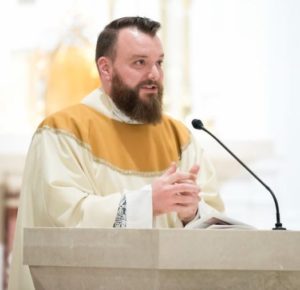 Dear Brothers and Sisters in Christ,
Dear Brothers and Sisters in Christ,
This week, the Catholic Church in the United States marks Religious Freedom Week. In the coming days, the United States Conference of Catholic Bishops encourages us to pray for the protection of our religious freedom and to stand in solidarity with those throughout the world who do not enjoy the same protections we do in our own country. I encourage you to visit the USCCB’s website (https://www.usccb.org/committees/religious-liberty) to learn more.
In the end, our desire to protect religious liberty is rooted in the Catholic understanding of the fundamental dignity of the human person. To recognize in others the image and likeness of God is the foundation for our ability to respect and honor any characteristic that another possesses. That reverential attitude is cultivated first and foremost by our reverence for God. Cardinal Robert Sarah, in his book “The Day is Now Far Spent,” writes: “The loss of the sense of God’s grandeur is a dreadful regression toward savagery. The sense of the sacred is indeed the heart of all human civilization. The presence of a sacred reality gives rise to sentiments of respect, gestures of veneration. Religious rites are the mold that shapes all attitudes of human politeness and courtesy. Indeed, if every person is respectable, it is fundamentally because he is made in the image and likeness of God. Man’s dignity is an echo of God’s transcendence. But if we no longer tremble with a joyful, reverential fear before the greatness of God, how could man be for us a mystery worthy of respect? He no longer has this divine nobility. He becomes a piece of merchandise, a laboratory specimen. Without the sense of the adoration of God, human relations become tinged with vulgarity and aggressiveness. The more deference we show to God at the altar, the more tactful and courteous we will be toward our brethren.”
Note the phrase Cardinal Sarah uses: “if every person is respectable.” Here, he uses the word quite literally – able to be respected. If every person is able to be respected, considered worthy of respect even before any particular characteristics are known, it is because of the way in which the person is created. And since we know that every person is created in God’s image and likeness, an image and likeness which calls forth utter respect and honor, then we must reverence God’s image in the persons around us. The path to that reverence can only be found if we encounter God Himself, though. Personal contact with the Lord in worship draws us into an understanding of God’s utter goodness. Religious rites, especially our liturgical practices, teach us that there are things beyond our grasp, powers beyond our visible world. The Divine power constantly at work is what we encounter when we worship. The Mass cultivates in our hearts a desire to adore and to worship, which in turn has the effect of inspiring a broader attitude of reverence for the persons in our world.
As you read this, high school students from parishes in Fairfield are participating in Catholic Heart Workcamp in Nashville, TN. They will serve the poor who are in need, whether material or spiritual. Their service is offered to Catholics and non-Catholics alike. Each day begins with a Mass, an act of worship, meant to cultivate for them an attitude of reverence for the people they serve. A common question when taking students for a mission trip of this sort is “Why not find service projects here at home?” There are, to be sure, countless needs, very real poverty, and plenty of work that can be done in our own backyards. How often, though, we become blind to them because they are familiar. The experience of stepping away from one’s neighborhood, and doing so with the intention of helping somewhere else removes the obstacle of unintentional blindness. We might not notice a neighbor’s need, but the same need experienced by a total stranger seems far more obvious. Seeing the stranger’s need for a period of several days, days in which one is approaching the altar of the Lord with reverence, gives a greater vision and outlook. With this improved vision, we return home with eyes that can truly see. Our students go away to serve, not that they might ignore the need of their own community, but so they can be given new eyes to see, and new hearts to love both the poor they do not see and the poor they know Please pray for our students as they serve this week, and pray for a greater appreciation for the gift of religious freedom for all people, an appreciation that flows from our understanding of the dignity of the human person, which in turn we learn from our worship of Almighty God.
Peace,

Fr. Sam


